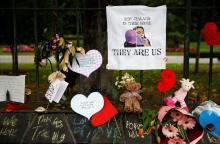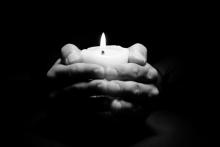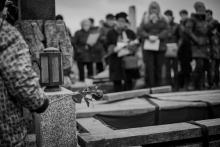Grieving

O God, we grieve the hatred, the ugly, racist fear
that hurts our common living and harms those you hold dear.
For Muslims who were gathered to worship and to pray
soon found their lives were shattered as violence filled their day.

We are brokenhearted by the murders of nine parishioners at the Emanuel African Methodist Episcopal Church in Charleston, S.C. We join our brothers and sisters in deep lament for the lives lost in this evil act, and our prayers go out to all of the victims, their families and their communities.
Atrocities like this wound the very soul of our nation. We must not merely attribute this horror to the depraved actions of one individual, mourn those we have lost, and move on as if there is nothing more to do. In his statement yesterday, President Obama quoted Dr. Martin Luther King, Jr.'s words in the wake of the bombing of a black church in Birmingham, Alabama in which four little girls were killed:
"...We must be concerned not merely with who murdered [these girls], but about the system, the way of life, the philosophy which produced the murderers. Their death says to us that we must work passionately and unrelentingly for the realization of the American Dream."
The deep wounds of racism, America's original sin, still linger in our society, our institutions, and in our minds and hearts — sometimes explicitly, but far more pervasively through unconscious bias. Wednesday's terrorist act is the latest manifestation of this lingering sin. Are there no safe places for black people in our country, even the places where they come together to worship?
We all have the responsibility to overcome both the attitudes and the structures of racism in America. Today we mourn, but tomorrow we must act.

Today, three years to the day after my daughter Katherine’s (“Katie’s”) death (May 9, 2010), we inter her cremains. “IT’S RAINING, IT’S POURING” was written the day we learned that Katie’s incurable Leiomyosarcoma had taken a turn for the worse. In memory of Katherine (“Katie”) Elizabeth Slaikeu Nolan.
Gordon C. Stewart Feb. 11, 2009
It’s raining, it’s pouring
The old man is snoring
He went to bed and he bumped his head
And couldn’t get up in the morning
It’s a day like that. I bumped my head on the illness of a 33 year-old loved one. It’s raining sadness. I’m having trouble getting out of bed in the morning.
Terminal illness has a way of doing that unless you believe in miracles of divine intervention or you have extraordinary powers of denial.

Pastor Rick Warren, the best-known name in American evangelism after Rev. Billy Graham, lost his 27-year-old son, Matthew, to suicide on Friday.
In the days since, uncounted strangers have joined the 20,000 congregants who worship at the megachurch network “Pastor Rick” built in Southern California, Warren’s nearly 1 million Twitter followers and hundreds of thousands of Facebook followers in flooding social media with consolation and prayer.
“Kay and I are overwhelmed by your love, prayers, and kind words,” Warren tweeted on Sunday. “You are all encouraging our #brokenhearts.”
But a shocking number are taking the moment of media attention to lash out at Warren on their digital tom-toms. The attacks are aimed both at him personally and at his Christian message.
As our nation mourns the untimely death of the King of Pop, I am grieving over the death of a lesser know man: a man whom many will never know, but whose mark on the world is significant. Two weeks ago, Rev.
When tragedies like the Virginia Tech massacre occur, we all share certain questions.
Why did this happen? How could this happen? Should anyone be blamed? Should someone be punished?
Often these questions lead us to seek a kind of rational explanation - so that the irrational can be folded into our sense of order in the universe. Often these questions send us on a search for someone to blame - a person, a group, the devil, even God.
I have found that our [...]
Thank you for publishing Dan Charles’ hymn to the life of Nelson Good (“Everything He Touched Turned to Community,” December 2005). I’m one of those people who benefited from the “expanding circles” of Nelson’s life. I never met the man, but I loved someone who loved him, and thus was privileged to read Betty Good’s e-mail epistles about life in the midst of dying and grief. One was aptly titled “Abrupt Grace.” It offered deep wisdom about living and leaving a good life.

Spiritual leaders gently guide bereaved souls through the holy land of grief and loss.

editor's note: This article was first published in the January-Febuary 2002 issue, only months after the attacks on September 11, 2001.
"They sat there on the ground beside him for seven days and seven nights. To Job they never spoke a word, so sad a sight he made." —Job 2:13
IN RECENT STUDIES of initiation rites, which seem to have been strategic for human survival in most of human history, I have discovered from Victor Turner the concept of "liminal space." He says that it is very hard to come by in the modern and now post-modern world. We are now too strategic, functional, and hurried to easily seek what the ancients sought above all else. Only pain is now strong enough to lead us into this unique place "where all significant transformation happens."
I suspect America is in a unique liminal space [post-Sept. 11]. Our attitudes are numbed, absolute, and strange. The old constituencies are unpredictable and misshapen. There is something new afoot, not only politically but also somehow archetypally and on the level of the psyche and soul. We are tipping on the balance, and usually God is an opportunist in such situations—waiting at the bottom of the slide.
Let me first explain what I mean by liminal or sacred space (I will use the terms almost interchangeably). "Limina" is the Latin word for threshold, the space betwixt and between. Liminal space, therefore, is a unique spiritual position where human beings hate to be but where the biblical God is always leading them. It is when you have left the "tried and true" but have not yet been able to replace it with anything else. It is when you are finally out of the way. It is when you are in between your old comfort zone and any possible new answer. It is no fun. Think of Israel in the desert, Joseph in the pit, Jonah in the belly, the three Marys tending the tomb.
As someone who’s had several deaths in my family, I can testify that prayers and casseroles are both helpful to the grieving process. But they’re not the only things that church people have to offer.
Members and pastors of St. Catherine of Siena parish in Austin, Texas, provide the bereaved with babysitting, transportation help, meals, liturgy planning, accompaniment to the funeral home, a post-funeral reception, bereavement groups, and counseling. Last year parishioners Carole Hawkins, Bob Leidlein, and Cheryl Grossman put together a resource booklet (incorporating materials from the Austin Memorial and Burial Information Society) after having shared their "funeral stories" with one another. They credit Father Oliver Johnson for actively encouraging parishioners to draw from their experiences and create ministries for the whole community.
Grossman is involved in plans for a diocesan-wide conference on the pastoral response to end-of-life issues. "This opens the forum to a large geographic area and a diverse community," she explains. "Folks without many financial or education resources will have access to a wide variety of experience and information."
Cheryl Grossman and her husband used to laugh together about all the "rigmarole" that most funeral services involved. So when he died suddenly in October 1997, Cheryl knew that he would want the arrangements to be simple. Grossman, with a friend to support her, went to a funeral home to arrange a direct cremation. The funeral director kept "upselling"—pressing her to consider more expensive alternatives.
"Had I not had a friend who went with me, and had I not had a firm resolve, I probably would have signed anything," she says. "To be manipulated in that way at that time was one of the most obscene things I’d ever experienced."
Cheryl Grossman’s funeral home encounter is a common one. Not so common is how she took her experience to church—and how her church embraced it. Cheryl’s Catholic parish, St. Catherine of Siena in Austin, Texas, has offered a diverse array of practical and pastoral supports to the grieving for some time. Last year Grossman and two other parishioners helped create a death and funeral resource booklet that gathers information on all applicable parish ministries and other area resources in a convenient portable form. It includes specific information on affordable funeral options, planning sheets, and step-by-step advice for those dealing with a death in the family (see "Reclaiming Our Rites," p. 33).
Such a booklet is a simple, straightforward thing, but not every church would know how to welcome it. Most American Christians, including clergy, are almost as comfortable talking about the practical, concrete details of funerals as they are talking about the practical, concrete details of sex. In other words, the topic doesn’t come up much. And unlike sex, funeral planning isn’t a hot topic outside of church either.
It is often assumed that younger people have no respect for their elders and even less reverence for history.